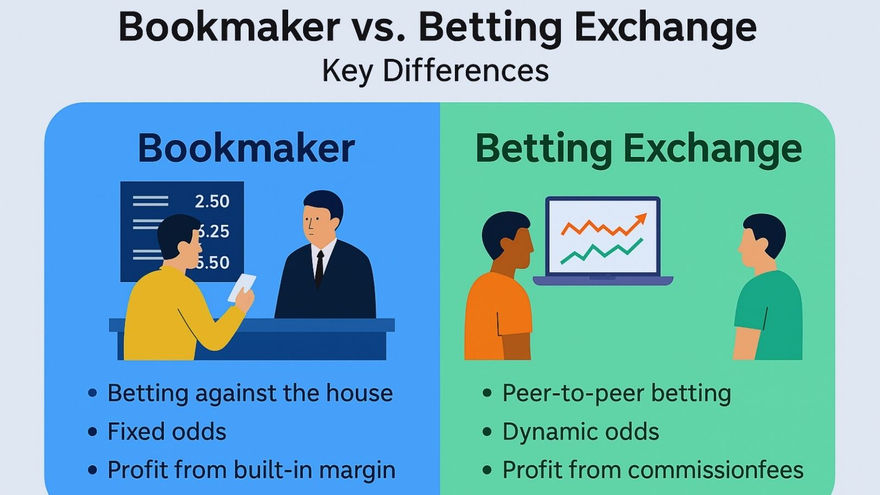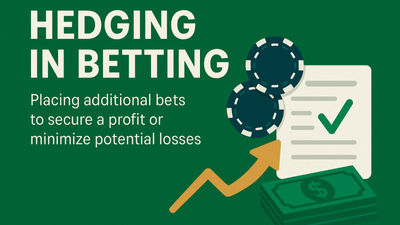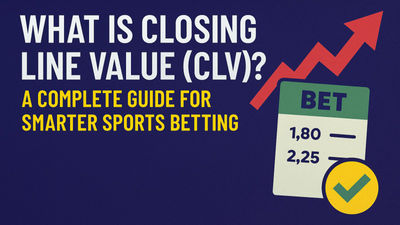Are you new to online sports betting? Understanding the difference between a bookmaker and a betting exchange is important. While both platforms enable users to place bets on sports events, they function in distinct ways. In this article, we’ll explain the key differences between bookmakers and betting exchanges to help you make an informed decision and choose the platform that best suits your betting style.
📘 What is a Bookmaker?
A bookmaker, also known as a traditional sportsbook, is a platform or operator that sets the odds and accepts bets directly from users. In this setup, the bookmaker acts as the "house", meaning it takes the opposite side of your bet. The bookmaker makes a profit by building a margin—called the overround—into the odds it offers, which ensures they have an edge over the bettor regardless of the outcome.
✅ Key Features of a Bookmaker:
Sets fixed odds for every event
Offers a wide range of sports and betting markets
Accepts bets against the house
Provides bonuses, promotions, and in-play betting options
🔍 Example:
If you bet ₹1,000 on India to win a cricket match at 2.00 odds, and India wins, the bookmaker pays ₹2,000 (including your stake). If India loses, you lose your bet and the bookmaker profits.
🔄 What is a Betting Exchange?
A betting exchange is a platform that allows users to bet against each other, rather than against a traditional bookmaker. In this model, the exchange serves as a middleman, matching bets between individuals who want to back or lay an outcome. Instead of making money from odds margins, the exchange charges a small commission on winning bets.
✅ Key Features of a Betting Exchange:
Users can back (bet for) or lay (bet against) an outcome
Odds are set by the users themselves
More competitive odds due to the peer-to-peer model
Lower margins compared to bookmakers
🔍 Example:
You back a football team to win at odds of 3.0, and another user lays that same bet. If your team wins, you win the bet and the other user pays you. The exchange takes a small commission from your winnings.
📊 Bookmaker vs Betting Exchange: Side-by-Side Comparison
Feature | Bookmaker | Betting Exchange |
Betting Style | Against the house | Peer-to-peer |
Odds Set By | The bookmaker | The users |
Ability to Lay Bets | ❌ Not possible | ✅ Yes |
Margin/Commission | Included in odds | Commission on winnings |
Liquidity | Guaranteed by bookmaker | Depends on market activity |
Complexity | Easy for beginners | Requires understanding of lay/back bets |
🎯 Which One is Better?
Choose a Bookmaker if you're new to betting and prefer a simple, hassle-free experience with promotions and guaranteed liquidity.
Choose a Betting Exchange if you're an experienced bettor looking for better odds, the ability to trade positions, or lay bets.
📌 Pros and Cons
✅ Bookmaker – Pros:
Simple and beginner-friendly
Wide range of markets
Bonuses and free bets
❌ Bookmaker – Cons:
Lower odds due to margins
No option to lay bets
✅ Betting Exchange – Pros:
Higher odds potential
Lay and back bets allowed
Ideal for value betting and arbitrage
❌ Betting Exchange – Cons:
More complex interface
Lower liquidity in niche markets
Commission on profits
❓FAQs About Bookmakers and Betting Exchanges
Can I use both a bookmaker and an exchange?
Yes, many professional bettors use both to compare odds, hedge bets, and take advantage of market inefficiencies.
Which is more profitable—bookmaker or exchange?
Exchanges often offer better odds, which can lead to higher profits in the long run, especially for value bettors.
Are betting exchanges legal in India?
Legality depends on local regulations. Most Indian users access international exchanges like Betfair through VPNs, but it’s important to check the legal status in your region.
What is a lay bet?
A lay bet is when you bet against an outcome happening. For example, laying Mumbai Indians means you win if they lose or draw.
Understanding the difference between a bookmaker and a betting exchange can dramatically change your betting strategy. While bookmakers are ideal for casual bettors, exchanges offer more flexibility and often better odds for seasoned punters. Choose the platform that aligns with your goals, risk appetite, and level of experience.
















